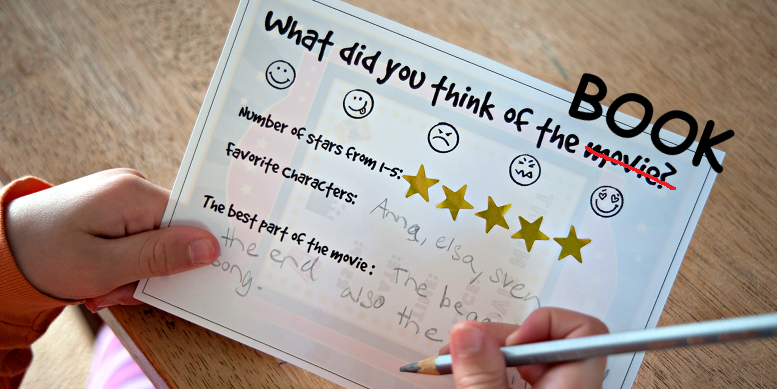As a fan of linguistic-fiction (and you should totally read my story Devilese plug plug plug), I get excited every time I see a new entry into the genre. So when I heard about the upcoming movie Arrival where a linguist cracks an alien species’ language, I was sold from the get-go.
Here’s the teaser trailer for the film if you haven’t seen it yet:
And best of all, Arrival is based on a short story – “Story of Your Life” by Ted Chiang. Once I found that out I immediately read the whole thing, and I have to say it was one of the best short stories I’ve read… ever.
Unfortunately to explain why the story is so good, it requires some spoilers. If you haven’t read the story yet, I highly recommend doing so before continuing. It’s not very long and you can get it here on Amazon. So go read it. I’ll be waiting.
.
.
.
.
.
All right, read it? Great. Let’s get to it.
Aside from just being good fast-paced science fiction, “Story of Your Life” has three things going for it that really set it apart: (1) it has an alien language that’s ACTUALLY ALIEN, (2) its unique structure, and (3) its humanity. Let’s talk about all three in more detail.
(1) It has an alien language that’s ACTUALLY ALIEN
As an armchair-linguist, language interactions with aliens in sci-fi usually end up disappointing. What should be one of the most interesting parts of making contact is explained away with a handwave. There’s always a universal translator, or the aliens somehow speak English, or whatever. And even if the aliens do have their own language, it’s usually based on human language constructs.
But in “Story of Your Life,” the aliens’ language (called “Heptapod”) is so different that the entire plot is based around decoding it. Sure this isn’t a completely original idea; the 1957 short story “Omnilingual” by H. Beam Piper was about archaeologists on Mars decoding an alien language by using the periodic table as a “Rosetta Stone.” But it’s how Chiang takes the idea of what would happen to the person decoding the language and runs away with it that makes the story something special.
For those unaware, the linguistic theory known as the Sapir-Whorf Hypothesis states that the structure of a language influences the thought and behavior of its culture and people. It’s been debunked many times, but the opposite of the Hypothesis – that culture influences language – is very much true.
As an easy example, Japanese has different politeness level verb conjugations and name titles. But the Japanese language didn’t make Japanese culture value hierarchy and politeness, instead Japanese culture already valued hierarchy and politeness and its language evolved to reflect that.
Learning Japanese has greatly influenced the way I perceive the world. Referring to children, my friends, parents and wife all as “you” feels a little strange, and I am much more conscious of the politeness-levels we have in English (ie: “Would you like? vs. Do ya wanna?”).
And that’s just learning Japanese; what would happen to the brain of someone learning an actual alien language?
“Story of Your Life” attempts to answer that question and succeeds with flying colors. The aliens in the story perceive time differently than humans. Rather than a succession of events with free will, the aliens view time as a whole, seeing everything that has already happened and will come, and their actions are merely performances in the already-written play of life.
As the narrator learns more Heptapod, her perception of time changes as well. She is able to see into the future, to the time when she will have a daughter, all the little interactions they will have for better and for worse, and even her daughter’s early death.
As someone whose life has been influenced by learning a foreign language in both good and bad ways as well, I felt this was a beautiful way of showing how learning a foreign language changes you. Even learning what she does about the future, the narrator does not regret her decision to study Heptapod, and I think anyone who has voluntarily studied a foreign language out there would agree.
(2) Its unique structure
I turn into a squealing fanboy whenever a story’s physical structure manages to work together with the plot to form a delicious conglomeration of writing, and “Story of Your Life” is one of the best I’ve seen.
Since the author is not an alien, her perception of time will never 100% change over to theirs. She is still human and still has her human perception of time. She goes back and forth perceiving time as a straight line and completed book. One line from the story expresses this perfectly:
“It’s like that famous optical illusion, the drawing of either an elegant young woman, face turned away from the viewer, or a wart-nosed crone, chin tucked down on her chest. There’s no “correct” interpretation; both are equally valid. But you can’t see both at the same time.”
And Chiang doesn’t just tell us that the narrator is experiencing time like this, he shows us in the story structure. Interspersed between the “main” plot of talking to the aliens are snapshots of the narrator interacting with her daughter. At first we assume that she is remembering these memories, but the use of the future tense within them hints that something is not quite right.
It’s not until halfway through that we make the realization she is remembering her daughter who hasn’t been born yet, and seeing things as they will happen decades in the future. It’s a great twist and fits the plot of the story so well you have to wonder if Chiang was initially inspired by the structure itself, then just wrote a story that happened to work with it.
(3) Its humanity
We humans are very vain. We only like stories about humans. Even in stories not about humans (animals, aliens, toys), the characters are given human-like qualities. One day I hope to see (or write!) a story that is truly alien, but until then I’m just another human that likes human stories.
And even though “Story of Your Life” is about decoding an alien language, the humanity is dripping off the pages. The best sci-fi always makes some comment on the human condition, and this is no exception.
Here we are reminded of our weakness as one-way beings. We cannot go into the future or the past, we can only exist as we are right now. We can’t learn from the future to change the present, but we can learn from the past to change the future; and that is what really separates us from other species on Earth.
Sure, even if everything until the end of time is already decided, that’s great – we humans don’t care. We’re still going to plug forward, doing whatever we can to make decisions that we feel will maximize our short lives.
One quote toward the ends sums this up well:
“From the beginning I knew my destination, and I chose my route accordingly. But am I working toward an extreme of joy, or of pain? Will I achieve a minimum, or a maximum?”
Even the narrator, who has literally seen the future, cannot learn from it. Even if our futures are known, we still can’t help but see them as unknown because we want to have free will (goddammit!). And that is what makes us human.
Maybe that’s why the aliens visited Earth, to study these strange creatures that think they have free will.
Conclusion
Is “Story of Your Life” perfect? No, but it’s pretty damn close. My only complaint is that some of the actual science bits went on a bit long and were just a technical. But they also helped make it feel more realistic too, so honestly I’m really pulling at threads here.
If you haven’t read “Story of Your Life” yet (shame on you for reading this first!), then check it out. If you like sci-fi, linguistics, cool twists, emotionally moving scenes, and/or you are a human, then I think you’ll like it.
Final Score: 5/5 – Neapolitan

(Featured image via Flickr – Personal Creations, edited by me)

Comments are closed.